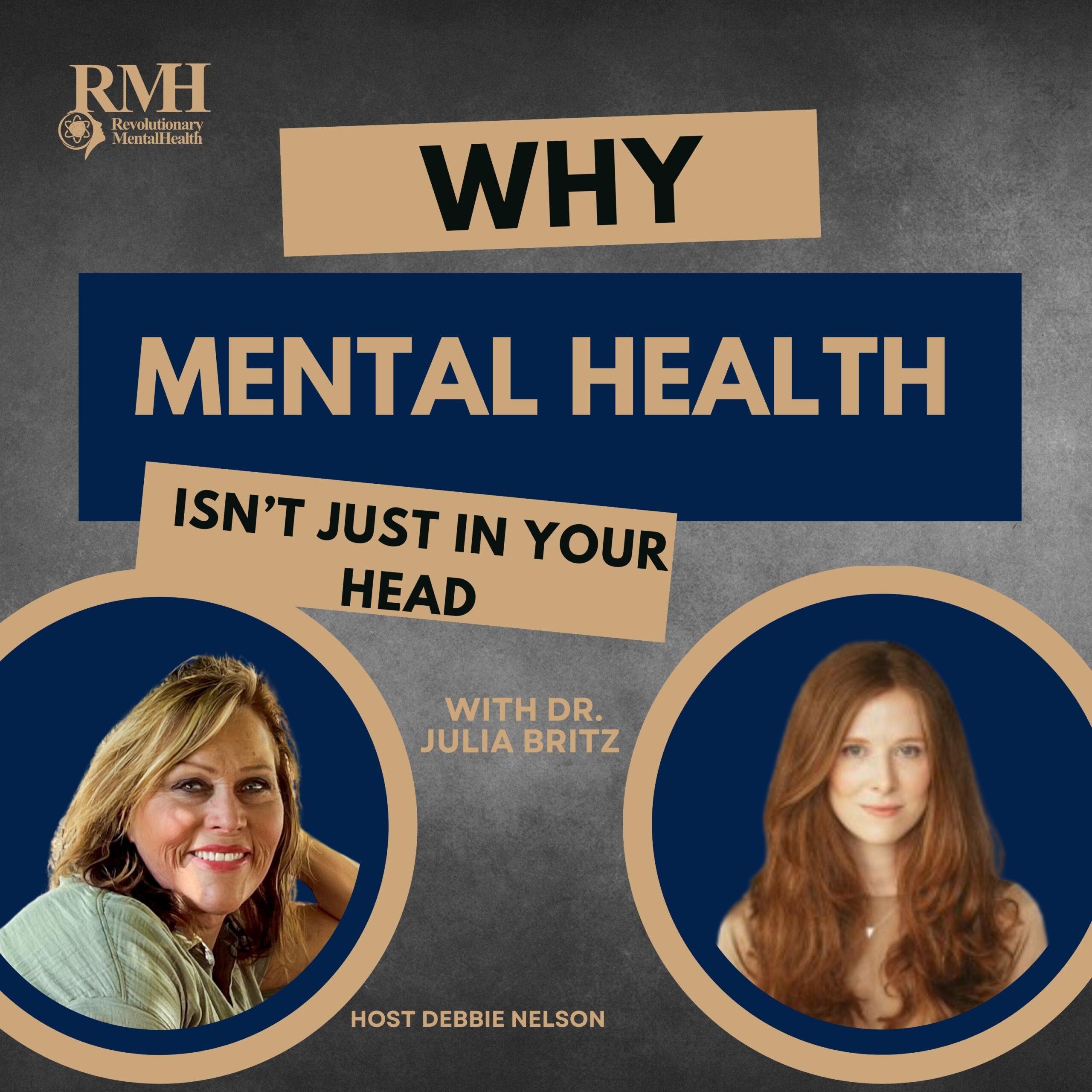
Episode ?: Dr. Julia Britz Interview
Sit down with Dr. Britz a leading expert in mental health to learn different ways of medication tapering and root cause therapy for suffering from OCD, anxiety and other challenges.
In this inspiring episode, we sit down with Dr. Britz, a leading expert in mental health, medication tapering, and root-cause therapy for individuals suffering from OCD, anxiety, and other challenging conditions. From navigating complex medication regimens to uncovering underlying causes like nutritional deficiencies, parasites, and environmental triggers, Dr. Britz shares her expertise on helping patients reclaim their mental and physical health.
Whether you’re struggling personally or looking to support a loved one, this episode offers practical advice, hope, and insight from a compassionate doctor who has helped countless people find relief.
WHAT YOU’LL LEARN IN THIS EPISODE
- How Dr. Britz safely helps patients taper off medications like benzodiazepines, SSRIs, and antipsychotics.
- Why understanding root causes—like nutrition, parasites, and environmental factors—is critical for long-term mental health.
- How telehealth and innovative testing methods, like bioresonance, are changing the way mental health care can be delivered.
KEY TAKEAWAYS FROM THIS EPISODE:
- Abruptly stopping psychiatric medications can be dangerous ot linear—always work with a professional.
- Many medications provide temporary relief but may not address underlying OCD and anxiety causes—don’t trade up for more medications.
- Supportive tapering protocols —tapering with nutrition and supplements can drastically reduce withdrawal symptoms.
- Root cause investigations can reveal surprising factors—parasites, mold exposure, or nutrient deficiencies can contribute to mental health issues.
- Telemedicine– allows patients to receive compassionate, effective care from home, reducing stress and barriers to treatment.
Social Media Snippets (Tweetables or IG Captions):
💔 “Struggling with OCD or anxiety? Dr. Britz shares life-changing strategies for safely tapering medications and addressing root causes in this episode! 🎧✨ #MentalHealth #OCDRecovery #AnxietyRelief”
🌀 “Medications can help—but are they enough? Learn why uncovering root causes is key to lasting relief from anxiety, OCD, and depression. Listen now! 💡 #MedicationTapering #RootCauseHealing”
🌿 “From benzodiazepines to SSRIs, Dr. Britz explains how supportive tapering can change lives. Don’t miss this episode! 💊❤️ #MentalHealthMatters #TelehealthCare #HealingJourney”
MENTIONED ON THE SHOW/ RESOURCES
- Dr. Britz Website and telemedicine bookings
- Dr Julie Britz Ted Talk
- Follow Dr Britz on Instagram
- Psych Med Tapering Support
RATE AND REVIEW THE PODCAST
If this episode resonated with you, we’d be incredibly grateful if you’d take a moment to rate and review the podcast on iTunes. Your voice helps amplify these powerful stories and allows us to grow a community rooted in healing, truth, and transformation.
✨ We read every single review—and your words truly matter.
Click here to leave a review and help spread the revolution.
Disclaimer: The information provided during the Revolutionary Mental Health Podcast is for educational and informational purposes only. It is not intended to replace professional mental health care, diagnosis, or treatment. Always seek the advice of your physician, therapist, or other qualified health provider regarding a mental health condition.
Views expressed are those of the individual speakers and not necessarily Revolutionary Mental Health organizers and Producers.
Read the transcript
Debbie (0:00):
Hello and welcome to Revolutionary Mental Health. My name is Debbie Nelson, and I’m joined by Dr. Julia Britz, who I deeply admire for what she’s done, the people she treats, and how she helps. I’m a huge fan, and this won’t be the first or last time I feature Dr. Britz because she is truly a powerhouse in mental health. Welcome, Julia.
Dr. Julia Britz (0:32):
Wow, thank you so much.
Debbie (0:36):
There are certain people who, over time, you hear countless referrals about. People are thrilled with the treatment they’ve received—and more importantly—they get better. It’s easy to promote work like yours. I like to start by asking about your story. Many people have heard it, but it’s so special and really explains why you’re so effective at what you do and how you got into this work.
Dr. Julia Britz (1:05):
Thank you. Well, it’s funny—I tell it a little differently each time because I remember more things as I reflect. I was a very nervous, shy kid. That’s okay—there’s nothing wrong with it—but I think it shaped what I see in many people. Small personality quirks can turn darker when there’s an inflammatory process.
I was perfectionistic, eager to please my parents, and scared of a lot of things. By the time I was 19 or 20, my compulsive behaviors started to become noticeable. I would spin on staircases, park repeatedly, turn the radio on and off, or even worry I’d run over someone on the freeway and have to check again. Classic OCD behaviors.
I was too scared to try medications, worried about side effects. But one weekend, I hurt my neck and ended up at a local clinic. The practitioner asked about my period, gave me supplements, and I had the best sleep ever. This led me to his mom, who used bioresonance equipment. I went in because of PMS, sleep issues, and digestive problems. She immediately asked if I had OCD. I admitted I did, expecting it to be genetic and untreatable. She said, “No, we can do something about that.”
A month or two later, I was mostly free from obsessive-compulsive behaviors. My brain got quiet. That experience changed my life, and now I work with the same equipment that helped me because it truly transforms people.
Debbie (5:10):
That’s incredible. Most people never hear there’s an antidote. Mental health conditions often feel like an immutable part of us. But there are interventions, lifestyle changes, diet, and treatments like bioresonance. Could you explain how bioresonance works for someone unfamiliar?
Dr. Julia Britz (5:47):
Sure. Bioresonance is similar to muscle testing but with less risk of human error. People send me their DNA or sample, and the equipment scans 150,000 electronic signatures through it, like tuning a radio. It identifies “static” in certain body systems.
This provides qualitative information—showing priorities and areas needing attention—rather than quantitative numbers like hormone levels. It helps me determine the order of treatment. Many patients have multiple overlapping issues—Lyme, mold, parasites, autoimmune conditions—and bioresonance helps identify what’s most critical to address first.
Debbie (7:14):
Exactly. Mental health is often treated in isolation, but the brain is interconnected with the body, digestion, thyroid, everything. When one system is off, mental health suffers. Most doctors don’t address this interplay.
Dr. Julia Britz (7:46):
Right. That’s why the genetic theory for most mental health issues feels lazy. There’s no single gene for OCD. Genes may influence risk, but they’re not the full story. Often, inflammation or nutrient deficiencies play a huge role. That’s why it’s important to dig deeper rather than accept a condition as untreatable.
Debbie (8:49):
Yes! I’ve experienced that firsthand. Many conventional doctors don’t explore the root causes, while functional medicine and practitioners like you do. Patients want answers beyond just a prescription—they want to support their body and optimize it.
Dr. Julia Britz (10:17):
Exactly. I see everything—from hormone dysregulation and nutrient deficiencies to parasites, Lyme, and even viral infections. Anything causing inflammation can contribute to mental health symptoms.
Debbie (11:11):
It’s powerful when someone goes beyond the standard therapy or medication and helps patients truly understand and address the root issues. You’re living proof of that. You’ve experienced OCD and found a way out, so you can empathize and guide patients with confidence.
Dr. Julia Britz (12:19):
Yeah.
Debbie (12:21):
Patients consistently say, “She doesn’t give up. She keeps trying until she figures it out.” Especially with OCD, which seems increasingly common.
Dr. Julia Britz (12:49):
Yes, a ton.
Debbie (12:45):
You also help people taper off medications safely, right? SSRIs, benzodiazepines, antipsychotics—you guide them while addressing root causes.
Dr. Julia Britz (13:06):
Right, and this is very common. Many people start a medication for OCD and find it offers some relief. But over time—sometimes 5, 10, or even 15 years—they’re still struggling with OCD. They might try different medications, but what I often hear is: “I want to come off this, but I’m afraid my OCD will get worse.” The truth is, they’re already dealing with OCD—the medication isn’t really fixing it; it’s just changing its “flavor.”
A lot of times, when we taper these medications and address the underlying causes of the original OCD, patients find that their symptoms disappear once they’re off the drug. Interestingly, sometimes the medications themselves can actually worsen the condition.
For example, I had a patient with severe anxiety, OCD, panic, and restlessness who was taking Klonopin. His psychiatrist increased the dose, thinking it might help, but it was actually making things worse. We decided to taper him off, which was challenging due to withdrawal, but once he was off, all those symptoms improved. The medication, intended to help, had been exacerbating his condition.
This isn’t unusual. Managing these medications is tricky because prescribing is often clinical and generalized—it’s not usually based on testing what truly works for that individual.
Debbie (14:48):
Yeah, I always say the progression is really sad to watch, especially with people on benzodiazepines. Often, the next step ends up being antipsychotics when their dose is already too high or doctors are reluctant to give more. My heart always breaks realizing that even with abrupt changes, people can suffer so much. You see so many who are struggling because of these rapid transitions, and yet nothing else has worked for them.
That’s why I love when I hear about what I call a supported taper—working with someone knowledgeable and experienced. I’m surprised at how many people just decide to taper off medications on their own. When I ask if they’ve addressed the original problem, they often say, “No, the meds just stopped working, so I went off them.” And then they experience withdrawal with nothing in place to support them in handling the underlying issues.
I always say this isn’t about being anti-medicine; it’s about responsible medicine—doing what truly supports someone’s long-term health and well-being. Benzodiazepines, in particular, are among the most difficult medications to navigate safely, and yet they’re often the ones people are trying to manage on their own.
Dr. Julia Britz (16:19):
Right? Yeah, a lot of people are on benzos, SSRIs, antipsychotics, and even medications that don’t quite fit into a standard class. Some are considered not very addictive, like gabapentin. And that’s true—it can serve as a bridge medication with a broader therapeutic index and even help people come off certain benzos. But for some, it can be really difficult, and for them, it becomes its own issue.
That’s part of the challenge—so much of this is unpredictable. It’s not about fault or blame; people are just trying to feel better, looking for answers and solutions. The disservice is that often when patients go to a psychiatrist or primary care provider and say, “I’m suffering,” what they’re also asking is, “Why? Can we fix this? Can we work on it?” They’re not just seeking a numbing agent—they want relief, yes, but they also want understanding so that they can work on the root issue while getting a temporary break.
Most people don’t want a lifetime on medication—they want tools, insight, and solutions that last.
Debbie (17:37):
Well, I think that’s the beauty of doctors like yourself who have really emerged in this space. There aren’t very many. And I want to clarify—I’m not talking about all natural paths in general—but some well-meaning naturopaths don’t fully understand the magnitude of these medications. You really have to be careful to make sure you’re seeing someone who knows these medications inside and out and can safely help a person taper off.
Some well-meaning doctors might think, “Okay, I fixed the problem, now you can stop the medication,” without understanding how complex a taper can be and what’s truly necessary. That’s why when I refer individuals, I always refer them to someone like you. Your practice is specifically about tapering and mental health, which is unique in the natural medicine world. Of course, all body systems are connected, but let’s face it—these medications are extremely challenging to navigate for anyone who wants to taper off. Your expertise in both the medications and mental health is incredibly vital.
We’re also starting to do mini webinar series so individuals can start getting a taste of your approach and the fundamentals you apply with every person. I’ve learned so much from this sector of mental health, and I love it—I never stop being amazed. Your caliber of doctor is unique; you never stop learning and contributing insights into what affects mental health.
For example, the first time you did bioresonance testing and said, “Oh, you have a parasite,” I remember thinking, “I have a parasite?” But now, in this world, I realize how common it is and how much it affects us. And in our country, we’re not doing regular parasite cleanses, which can then lead to a host of other issues. You really deal with everything—from parasites to mold to heavy metals and beyond.
And now, when people work with you, you offer telemedicine, but you also have a practice in Las Vegas, correct?
Dr. Julia Britz (20:24):
You know, I did have an in-person practice, but now I only do telehealth. It’s funny because even people in my local area, since it’s mental health, often feel more comfortable at home. They’d ask, “Do you do telehealth? I don’t want to come into the clinic today.” And I’d say, “Yeah, that’s fine.” I found that more people actually preferred it, which is honestly why I shifted to telemedicine.
I remember when my OCD was really bad—I couldn’t even imagine getting in a car, driving on the freeway, and going to a clinic. The whole process felt overwhelming. So I wanted to offer telehealth because asking someone who’s already struggling to leave their home can be just too much.
Debbie (21:30):
And you can order functional testing regardless of location, correct?
Dr. Julia Britz (21:39):
Yeah, exactly. A lot of times, I use bio resonance in conjunction with other labs, depending on what’s going on. For example, Lyme testing can be really expensive—a comprehensive panel for Lyme and co-infections can range from $900 to $1,800.
Because of that, many patients ask, “Can we do bio resonance first to see if anything shows up?” I always explain that it’s qualitative, not quantitative—I can’t “diagnose” based on it alone. But if something comes up that aligns with your symptoms, then it can help guide us. If it feels useful, we can use it as a starting point before running the expensive tests.
A lot of times, people do bio resonance, we see some Lyme markers, and then they go run the pricey Lyme test—and boom, there it is. That’s important because most Lyme clinics won’t accept bio resonance alone as proof. You still need a formal lab test. Once you have that, the clinic can say, “Great, now we know what therapy you need based on your lab results.”
So yes, I still really value using labs in conjunction with bio resonance, especially for cases like this.
Debbie (23:04):
How often do you do bio resonance? Is it usually always accurate?
Dr. Julia Britz (23:05):
When I first started, I was pretty new and admittedly skeptical, so I relied on a lot of labs just to confirm and verify things. Over time, I realized I really don’t need to use them unless it’s necessary—especially if the results won’t change our treatment plan. I’ve found bioresonance to be incredibly effective and surprisingly useful in so many ways.
Now, I even use it for animals—pets and children—which has been amazing. I’ve had so many cases where people come in saying, “My vet doesn’t know what to do, and my dog can’t tell me anything.” They’ll send me a sample, like fur, and we can run it. One memorable case was actually a horse. A ball of horse fur showed up at my office—funny, right? But it was incredible because the owner said, “It’s like $500 every time the vet comes out, and antibiotics aren’t working.” The horse had a severe cough and nasal discharge.
When I ran the bioresonance, it turned out the horse had a nasty pulmonary fungal infection. Once we identified that, we were able to test different nutrients and supplements to support his DNA and immune response. I suggested a portable nebulizer and a custom herbal blend, and we adjusted his nutrition. Later, the owner called me crying, saying, “Oh my God, he’s not sneezing, he’s not coughing—his lungs sound good!” It was such a rewarding moment.
Debbie (26:40):
Yeah, so Julia, Dr. Brits, you are probably one of the top people I recommend for individuals seeking relief from anxiety and OCD. And I say relief because, in this sector, so many people just can’t find it. Even with medications, often there’s only a temporary window of relief before the body acclimates. They become dependent on benzodiazepines and don’t know what else to do.
You really are—pardon me, this makes me choked up—you are genuinely changing people’s lives. These individuals are suffering and feel lost, and knowing you are there gives me immense confidence. I’ve done numerous interviews with you and will never stop because the effectiveness of your care is outstanding. You’re thorough, empathetic, and kind, guiding people who are profoundly suffering from OCD, anxiety, medication tapering, and depressive disorders.
Your choice to serve this demographic is remarkable. You could have chosen other areas—weight loss, for example—but this population is hard. People are at their wit’s end, unsure where to turn. Just the other day, a mother called about her 14-year-old son. She was upset and crying, and without hesitation, I knew exactly who could help her. Dr. Brits is the best at treating OCD and anxiety—if you don’t believe me, go watch her TED Talk.
You are compassionate, thorough, and committed to helping people get to the root of their issues. Honestly, that’s what people are craving right now—someone who truly listens and works to solve the underlying problem.
If you want to work with Dr. Brits, the links are below. She does telemedicine, seeing patients across the United States and even in Canada. Her specialty is helping people uncover root causes, and she’s especially knowledgeable about safely tapering medications. I always tell people: never abruptly stop psychiatric medications. There are serious ramifications, so please work with a professional.
If you suffer from OCD or anxiety, Dr. Brits is a queen in this field. She helps people address the core issues causing their struggles. I appreciate her deeply because we need more doctors like her. From the first time I met her, I knew she was special. She doesn’t just hand out answers—she works with patients through the process, helping them uncover what’s truly going on.
All people really want is someone who says, “I don’t know exactly what’s wrong, but I’ll help you figure it out.” That’s what you do, Dr. Brits. Thank you.
Dr. Julia Britz (29:45):
Thank you, Debbie.
Debbie (29:46):
No, you are. I just feel such a sense of peace knowing there are people like you working with those who are profoundly suffering. I was actually talking about this with other professionals in the industry, and one of them said the exact same thing—you absolutely instill confidence. When it comes to referring someone, I have no hesitation at all. I feel so confident sending someone to Dr. Britz. That says a lot.
You started this work out of passion, and you continue to inspire others through social media, sharing insights and actionable steps to help people realize that relief is possible. Most people don’t even know that doctors like you exist—they just suffer in silence. But you represent that entire sector of care that people desperately need.
Below, we’ll link all of Dr. Brits’ information so you can work with her directly. We’re also working on producing mini webinar series to help people get introduced to these professionals, understand the foundational approaches they use, and learn how they can guide individuals on their path to relief.
Obviously, doing comprehensive testing, like bio resonance, with Dr. Britz is ideal. But through this platform, we’re creating a synergy of resources for people suffering from these conditions—allowing them to connect, get to know, and work with these experts. I get emotional talking about this because I know the lives you’ve changed. Knowing the impact of your work fills me with confidence and hope. The world needs more doctors like you. The more we have, the more people—like that 14-year-old boy I mentioned earlier—can finally find answers. There are thousands of people suffering and unsure what to do. Hearing voices like yours gives hope and demonstrates there is a solution.
Thank you for doing this—I truly admire your work. Links will be below, and this won’t be the only time we feature you. Dr. Brits is prominent in this community for helping people taper medications safely. Whether it’s OCD, mold exposure, SSRIs, or benzodiazepines, her protocols make a difficult process far more manageable. She provides the supportive taper that people need—using nutrition, supplements, and careful monitoring—so individuals aren’t left to struggle through withdrawal or symptom rebound on their own. Without a supportive taper, it often turns into a cycle of switching medications rather than true recovery. If your goal is to break out of that paradigm, these are the doctors who can help you do it safely, effectively, and compassionately.
Dr. Julia Britz (34:09):
Not Good
Debbie (34:10):
Right. A typical doctor might help you taper, but when things start to go really badly, their only option is often to prescribe something different. These are the doctors who truly make a difference—they’re the ones where the tire hits the road, and they can change your life.
So thank you, Dr. Britz, for taking the time. I love you, and I think you’re amazing. We will continue moving forward, connecting people with incredible doctors, and Dr. Britz is absolutely one of the top ones I recommend. Thank you again!
Dr. Julia Britz (34:38):
Thanks Debbie
Debbie (34:41):
I’m Debbie Nelson, and I’m here to change the world and I am not alone. And Julia—you’re amazing. Thank you.Transcript goes here



